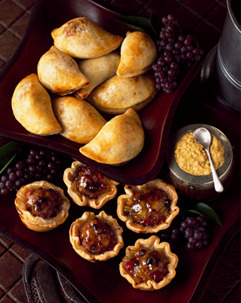Beef Purses
 Beef Purses
Beef Purses
Serves 8
I picked and cut most of their festival purses; and had not the old man come in with a whoo-bub against his daughter and the king's son and scared my choughs from the chaff, I had not left a purse alive in the whole army.
A Winter's Tale, 4, 4
In Shakespeare's day, meat turnovers like these were called "purses" because they looked like the small change holder people wore attached to their belt. The expression "cut purse" referred to a thief who cut the cord to steal the purse, an all too common occurrence in those days before policed streets.
The savory filling of tangy candied ginger and sweet dried fruit make these purses worth stealing! Enjoy them with a glass of cold ale before heading off to see your favorite production of Shakespeare or while watching one of the many great movies inspired by his work.
8 ounces ground round or ground sirloin
1/4 teaspoon ground rosemary
1/3 cup currants
6 dates, finely chopped
1 tablespoon finely chopped candied ginger
1/4 teaspoon ground cinnamon
1/4 teaspoon freshly ground nutmeg
2 tablespoons light brown sugar
1/2 teaspoon salt
Pinch of freshly milled black pepper
pie dough, homemade or store bought
1 large egg, beaten
Place the beef, rosemary, currants, dates, ginger, cinnamon, nutmeg, brown sugar, salt, and pepper in a bowl and mix well. Refrigerate for at least 6 hours, or overnight. Remove the meat from the refrigerator 1 hour before baking.
Preheat the oven to 350° F. Roll out the Renaissance Dough 1/8 inch thick on a floured work surface. Using a 3-inch round ring cutter, cut out 24 dough circles. Place 1 1/2 tablespoons of the meat mixture onto each circle, fold in half, and pinch the edges to seal. Brush the purses with the egg and place on a well-greased, nonstick baking sheet. Bake for 15 minutes, or until golden brown.
Original recipe: To make pursses or Cremitaries
Take a litle mary, small raysons, and Dates, let the stones bee taken away, these being beaten together in a Morter, season it with Ginger, Sinemon, and Sugar, then put it in a fine paste, and bake them or fry them, so done in the serving of them cast blaunch powder upon them:
The Good Husewifes Jewell, 1587
© Shakespeare's Kitchen: Renaissance Recipes for the Contemporary Cook by Francine Segan.




